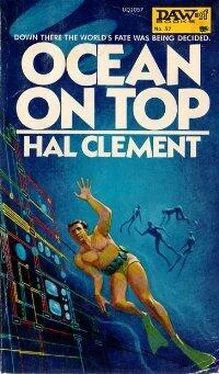Hal Clement - Ocean on Top
Здесь есть возможность читать онлайн «Hal Clement - Ocean on Top» весь текст электронной книги совершенно бесплатно (целиком полную версию без сокращений). В некоторых случаях можно слушать аудио, скачать через торрент в формате fb2 и присутствует краткое содержание. Год выпуска: 1973, Издательство: DAW Books, Жанр: Фантастика и фэнтези, на английском языке. Описание произведения, (предисловие) а так же отзывы посетителей доступны на портале библиотеки ЛибКат.
- Название:Ocean on Top
- Автор:
- Издательство:DAW Books
- Жанр:
- Год:1973
- ISBN:нет данных
- Рейтинг книги:5 / 5. Голосов: 1
-
Избранное:Добавить в избранное
- Отзывы:
-
Ваша оценка:
- 100
- 1
- 2
- 3
- 4
- 5
Ocean on Top: краткое содержание, описание и аннотация
Предлагаем к чтению аннотацию, описание, краткое содержание или предисловие (зависит от того, что написал сам автор книги «Ocean on Top»). Если вы не нашли необходимую информацию о книге — напишите в комментариях, мы постараемся отыскать её.
Ocean on Top — читать онлайн бесплатно полную книгу (весь текст) целиком
Ниже представлен текст книги, разбитый по страницам. Система сохранения места последней прочитанной страницы, позволяет с удобством читать онлайн бесплатно книгу «Ocean on Top», без необходимости каждый раз заново искать на чём Вы остановились. Поставьте закладку, и сможете в любой момент перейти на страницу, на которой закончили чтение.
Интервал:
Закладка:
I was now below the level of the lights themselves. They appeared to be strung on lines at intervals of about twenty yards, with the same spacing between lines. That was a guess, though, since I couldn’t actually see any supports. Their regularity bolstered the guess, though the fact that the wreck had come down just about on a line between two of the lights without appearing to disturb them counted rather against it. I wasn’t too surprised to see nothing growing or moving on the flat surface they illuminated, though of course I wouldn’t have been surprised to see a few tracks or holes scattered around.
At least, I wouldn’t have been surprised at them if I’d not seen the Pugnose’s landing. With that to go by, it was perfectly clear that whatever I was looking at was not sea bottom. It was more like a rubber sheet stretched like a tent roof over everything more than about ten feet down slope from me. The wreck had dented it but hadn’t punctured it, and the stuff was strong enough to hold up the comparatively small submerged weight of metal and plastic.
This, I reflected, could be useful. I had no idea why whoever was under the tent wanted to light up the outside, but unless the fabric were completely opaque they could hardly help seeing the shadow and the dent in their ceiling. That should bring people to investigate, and they would be easy to see without my having to use lights of my own and giving myself away. All I needed was one clear view of unauthorized human beings at the bottom of the Pacific; that, plus the scale of energy wastage I could already detail, would be all my report would need — a major control expedition would do the rest. No one expected me to arrest a group large enough to set up an installation like this, and I had no ambition that way either. To put it mildly, the tank wasn’t maneuverable enough to serve as a police car; I was in no position to arrest a passing shrimp. All I asked was a good look at a work sub, or a suit of pressure armor, or even a handling robot under remote control — anything that would show that this setup was being actively managed — one good look, and I’d be ready to drop ballast.
I wouldn’t do it too hastily, of course, for two good reasons. A sonarman might reasonably dismiss a sinking object as a piece of a wrecked ship, or even a dead whale, and not be too curious; but he would be most unlikely to feel the same indifference toward something rising. I’d have to take some time to evaluate the sonar danger. It was nice, but not conclusive, that there had been no sign of it so far.
The other reason against haste I didn’t know about yet, and didn’t learn for a number of hours.
I’m not a clock-watcher. I knew I had plenty of survival time in the tank and wasn’t keeping very close track of how much of it had passed. When the second reason did show up it never occurred to me to check the time, and for several hours after that I was very thoroughly distracted from such things as clocks. I can’t say, therefore, just how long I spent sitting in the tank waiting for something to happen. I can guarantee that it was a number of hours; long enough to get me bored, cramped, irritated, and more than half convinced that there was no one under that tent roof anywhere nearby. The idea that it might be someone who didn’t care a hoot about fragments of ship in his ceiling seemed too far out to be worth considering, if anyone had seen it, he’d have done something about it.
No one had done anything about it. Therefore, no one was within sight. And if no one was within sight under the fabric, I might as well take a closer look at it myself. Maybe I could even get a look under it.
Dangerous thinking, boy. Don’t let all those wasted kilowatts go to your head. You’re just a detached eyeball; if you don’t get back with information, anything you do manage to do is pure waste — and waste, of course, is the profane word around the Board.
It was a temptation, though. No motion — no sign of human life except the lights and the tent roof itself, and mighty little sign of any other kind of life. No sound. Nothing from the sonar frequency monitor. Why shouldn’t I roll gently down to the edge of the fabric and study it more closely?
The best answer to that question, of course, was that it would be the act of a dithering idiot. As time went on, though, it occurred to me once or twice that merely being here at all wasn’t the highest possible display of human intelligence. If I must act like a fool, I might as well be a real one. I don’t know where that sort of thinking comes from; maybe I should see that psychiatrist.
I’m not sure just how close I came to giving in. I know I almost pulled in the legs three times and each time thought better of it.
The first time I was stopped by something moving, which turned out to be a fair-sized shark. It was the first large living thing I’d seen since reaching bottom, and it set my thoughts off on another tangent for a while. The next couple of times I started to move the tank I was stopped by the memory of the shark; it had disappeared — had it heard something I couldn’t, that had frightened it off? I had no instruments outside for low or audible frequency detection, just the sonar receptors.
I know all this isn’t making me sound much like a genius, or even a reasonably competent operator. I wish I’d had more time to edit my memories a bit before having to tell this story. If I’m to justify the decision I’m trying to sell, I should have some chance to look like a sensible adult first. All I can put in for my own defense at the moment is one of those let’s-see-you-do-better remarks. Are you sure just how your own thoughts would have gone if you were practically helpless in a six-foot plastic bubble a mile under the ocean? If you’re not, please suspend your criticism until I’m done.
The second reason for not dumping ballast too hastily finally did show up. My attention was still pretty well focused on the wreckage, so I didn’t see it coming. My first glimpse was from the corner of my eye, and I thought for an instant it was another shark; then I realized it was human, and I had my evidence. Fine. Once it’s out of sight I can head for the surface.
Not a chance. What I needed was convincing evidence, and if my own eyes weren’t convincing me it was unlikely that my words would convince anyone else. What I saw was a person, which was all right in itself; a suit of four-inch polyphase armor, adequately powered in the limbs, will hold back the ton and a quarter or so per square inch that sea water exerts a mile down. Such armor will even let the wearer look rather like a human being and move about in a very clumsy walk.
It will not, however, unless he is immersed in an ocean of mercury, let him swim; and this clearly human figure was swimming.
It came into view some distance to my left, appearing in the light rather suddenly as though it had come down from the darkness above. It was swimming toward me and the wreck, not in any obvious hurry. As it approached, details became plainer; and the plainest of-all — plainer even than the fact that it was female — was that she wasn’t wearing armor. She was wearing a cold-water coverall type scuba suit, absolutely ordinary except that it had a spherical, transparent helmet instead of a breathing mask, and the ballast seemed to be in rings here and there around body and limbs instead of being fastened to the belt. I repeat — in fact, I had to repeat it to myself several times — that the garment was not pressure armor. Its wearer’s swimming motions showed plainly that it was nearly as flexible as ordinary skin, just as a scuba suit should be.
She didn’t seem to see my tank, which was some relief. She didn’t even seem to see the wreck until she was within twenty yards of it. She had been swimming very slowly along the edge of the tent roof with no more apparent purpose than someone out for an afternoon stroll, up to that point. Then she changed course and headed straight for the bow of Pugnose.
Читать дальшеИнтервал:
Закладка:
Похожие книги на «Ocean on Top»
Представляем Вашему вниманию похожие книги на «Ocean on Top» списком для выбора. Мы отобрали схожую по названию и смыслу литературу в надежде предоставить читателям больше вариантов отыскать новые, интересные, ещё непрочитанные произведения.
Обсуждение, отзывы о книге «Ocean on Top» и просто собственные мнения читателей. Оставьте ваши комментарии, напишите, что Вы думаете о произведении, его смысле или главных героях. Укажите что конкретно понравилось, а что нет, и почему Вы так считаете.












